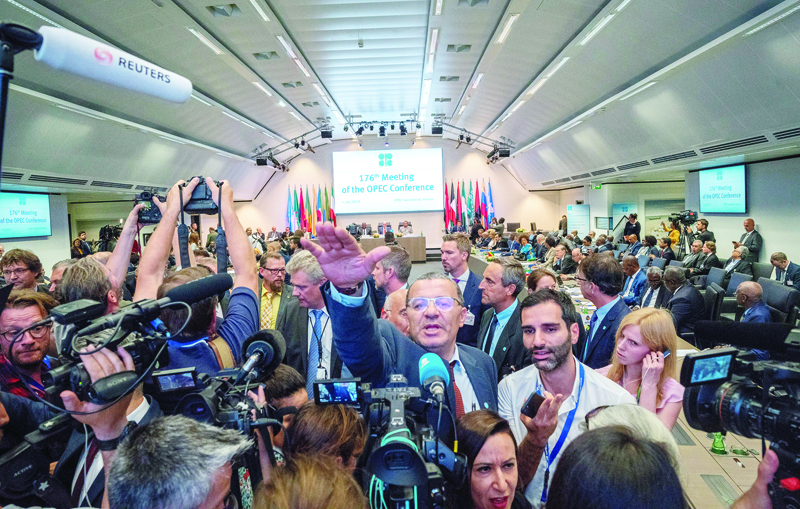

DUBAI/MOSCOW/LONDON: OPEC and other oil producers led by Russia were discussing their largest ever output cut yesterday in talks complicated by recent animosity and US resistance to mandating cuts. The spread of the coronavirus has slashed fuel demand for vehicles and planes and sent crude prices below the cost of production for many, including US shale oil producers. Benchmark Brent crude oil prices hit an 18-year low last month and are trading below $34 a barrel, half their level at the end of 2019.
President Donald Trump on Wednesday said US oil producers were already cutting production and warned that he had many options if OPEC leader Saudi Arabia and Russia did not reach a deal yesterday. Trump said last week he had brokered a deal with Saudi Arabia and Russia that could lead to cuts of 10-15 million barrels per day (bpd)or 10-15 percent of global supply. The largest one-off cut which the Organization of the Petroleum Exporting Countries (OPEC) has ever agreed was 2.2 million bpd in 2008.
More recently, Russia and nine other producers joined OPEC in cuts which reached 1.7 million bpd, plus another 400,000 bpd which the Saudis voluntarily held back. Riyadh and Moscow, however, last month fell out over continuing those cuts, which were allowing the United States and others not participating to gain market share. The United States has become the world's largest producer but Trump's administration has shown no appetite to mandate cuts. Saudi Arabia and Moscow have also not as yet publicly indicated any agreement on reductions or on how a cut would be distributed among participants.
Asked if a decline in US oil output due to weak prices could count as a reduction, Kremlin spokesman Dmitry Peskov said on Wednesday: "These are absolutely different reductions. "You are comparing overall decline in demand with cuts aimed at stabilizing global markets. These are different concepts," Peskov said. The meeting of producers on Thursday via video conference will be followed by one of Group of 20 (G20) energy ministers on Friday.
"This meeting will be an important opportunity to assess impacts on global energy markets and reassure both markets and energy consumers," Angus Taylor, Australia's energy and emissions reduction minister, said by email regarding the G20 meeting. He declined to comment on whether Australia would help by buying oil for storage in the US Strategic Petroleum Reserve under an agreement Canberra is negotiating with the Trump administration.
Baseline debate
Negotiating cuts will involve setting a baseline for them, an issue muddied after Saudi Arabia and Russia both announced plans to increase output following the collapse of talks among the so-called OPEC+ group of producers in Vienna on March 6. Saudi Arabia has ramped up supply to a record 12.3 million bpd in April from less than 10 million bpd in March.
Allies Kuwait and the United Arab Emirates have also raised production and Moscow has said Russian companies might boost output by up to 500,000 bpd. OPEC sources said Riyadh wanted any cuts calculated from its record April levels. But Russia has said cuts should be based on first-quarter output. "The issue is still the baseline," an OPEC source said. - Reuters

